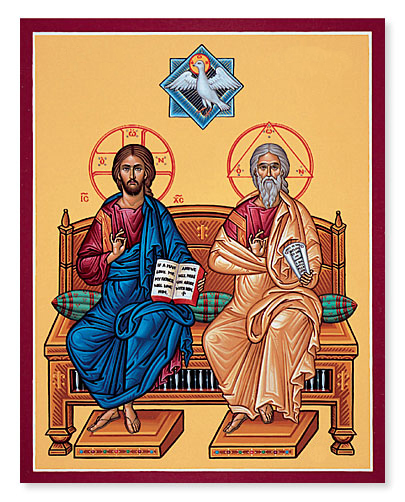Service/Accountability Series: Part 5 – Accountability Is A Multidirectional Street
 Years ago I journaled asking the Lord what this Five Fold Ministry is all about, and he gave me a simple diagram for a simple mind (which fits me).
Years ago I journaled asking the Lord what this Five Fold Ministry is all about, and he gave me a simple diagram for a simple mind (which fits me). 
If you extend the fingers of that diagram from each of the fivefold to the other members, a five pointed star in a circle is created. You now have an accountability structure between five different mind sets, passions, and points of view which together gives you a picture of unity.
Leadership with this model would be dynamic, for it would replace church counsels, pastor-parish committees, board of elders, strong pastor models, etc. because none of the five is “in charge”. The Holy Spirit is in charge, and the gifting that is needed at the moment can arise, thus the wheel can rotate when needed.

The evangelist comes to the forefront in an effort to birth the project; then the wheel turns. The pastor comes forth with a plan to shepherd the new flock, to meet their daily needs and teach them how to walk in this new found faith, birthed by the evangelist. The wheel turns again as the teacher shares scriptures from the Word, the Bible, to build up the saints and five direction while the prophet speaks Rhema life into those words. The wheel turns again, and the apostle, who has done nothing but “seen over” this process gives his “oversight” and approval of the whole picture working together in unity and direction.
All this works only if there is trust and faith in one another. Do we as a Church have the faith to trust the Holy Spirit to give us answers and/or direction? Do we have the faith and trust in our fellow believers whom we have bonded with to release control of the situation and allow each of the five fold to use their gifting and passion? Can I trust a brother or sister in the Lord who is different from me: one with an evangelistic heart and spirit to birth, one with a passion for shepherding to pastor, one with teaching talent to decipher the Logos Word, one with a prophetic heart and spirit to bring life to the Word, to the project, and to the group, and one who will over see, or see over what is happening without controlling it, only serving the others who are implementing, doing the work of the ministry? The purpose of the five fold in Ephesians 4 is “to equip the saints for the work of the service”. Doesn’t this look like “equipping” and releasing one another for the common good of the Church?
Can a model like this work in Christianity today? Only with faith and trust. Faith is the essence of things not seen but believed. Can we believe the Holy Spirit for answers and direction? Can what is not seen but revealed by the Holy Spirit be seen through the working out of that revelation through five different mindsets, points of view, and passions working in unity? Trust is letting go, not hoarding, not controlling, but freeing one to follow and serve. Most of all, none of this will work unless we as Christians begin to “lay down our lives for the brethren.”
Wow, faith, trust, love… write out of the book of II Corinthians. The first century Church at Corinth struggled with it, and the twenty-first century Church in my local town is still faced with it, unless we continue to ignore it! Do we have the faith? Can we trust? Can we love? That is the challenge of this blog!



































